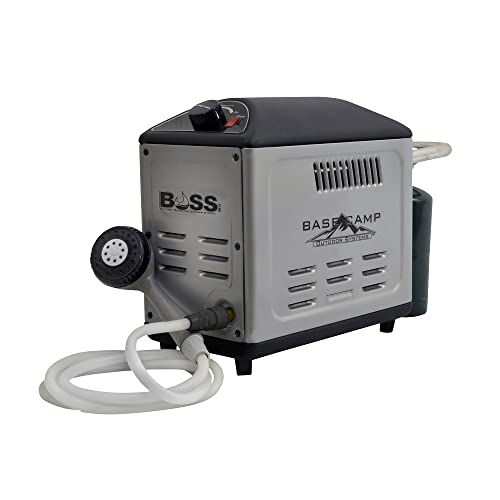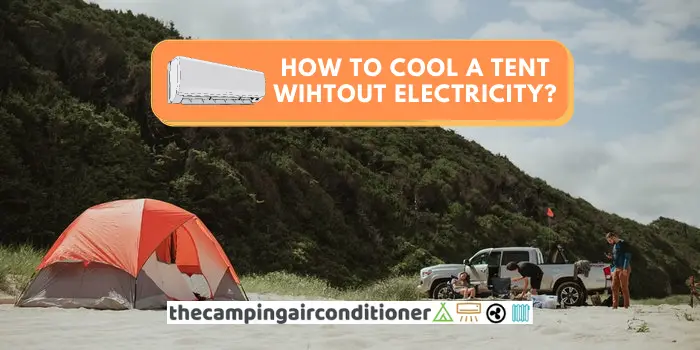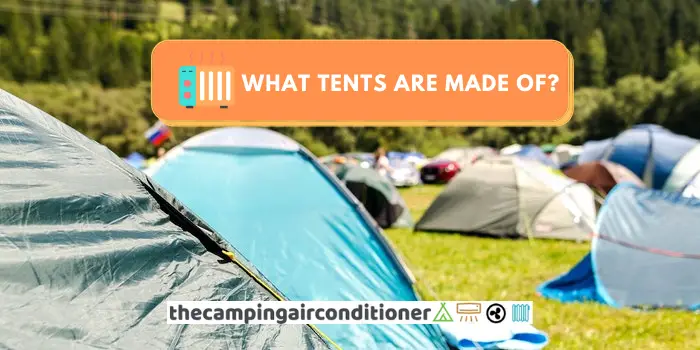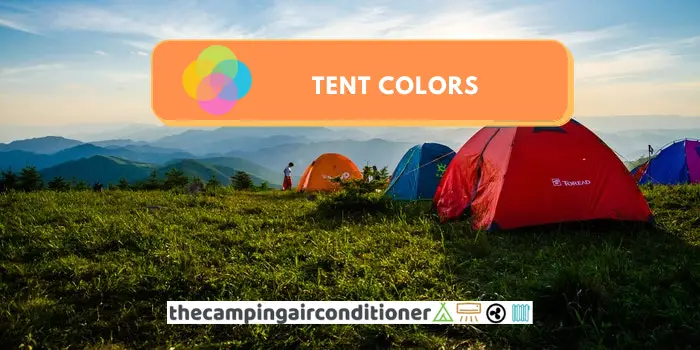The Camping Air Conditioner is sponsored by readers. When you buy through one of our links, we may earn an affiliate commission at no extra cost to you.
If you are camping affectionate and love nature, living permanently outdoors in a tent has already crossed your mind, right?
However, if you are considering this, you should have in mind that it would be best if you were careful and took into consideration a couple of issues before packing (how to address them), such as:
- The size and type of your tent,
- Campsite location and infrastructure
- Cooking your meals and potable water
- Weather conditions
- Items that will improve comfort
- Security
- Personal Hygiene aspects.
Let’s go through them below, but first, let’s highlight the benefits and drawbacks of living in a tent full time.
Living in a tent for the long term - advantages and disadvantages
As much as we love the concept of living camping 24/7, we need to be honest with ourselves and check whether the benefits of doing it outweigh the drawbacks. So let’s review them below.
- Saves money
- Minimalism
- Simple life and contact with nature
- Mental health
- Mobility (nomadism)
- Limited space and comfort
- Cleanliness and personal hygiene
- Limited (or no) electricity supply
- Protection against weather
- Security and health concerns
Benefits of living in a tent permanently
Well, there are plenty of advantages that we can mention, such as:
- Saves money – Yes, say goodbye to rent, mortgage, household taxes, and utility bills.
- Minimalism – If you are moving into a tent, you probably will realise how much stuff you have that can be donated or thrown away (happiness is not material!)
- Simple life and constant contact with nature – Yes, you will have a simpler lifestyle and probably start appreciating other aspects of life, such as simply sunbathing or listening to birds in the morning.
- Mental health – If you recharge your batteries by being in touch with nature, there is no need to say how much your happiness and mental health levels will increase when camping. No wonder why some many people move from big cities, such as New York, to the smaller countryside areas to enjoy life.
- Nomadism – Not happy with your campsite or even weather conditions? Why not pack and move around looking for another perfect spot to live – you can go beach camping in summer and stay in the forest during the cold season – it is up to you.
Challenges of living in a tent permanently
Among the challenges of living in a tent permanently, you should remember the following topics:
- Limited space and comfort – Unlike your apartment and house, which offers multiple and isolated rooms, your tent will have a limited space to move around, and comfort levels will be much lower compared to a typical dwelling.
- Cleanliness and Personal Hygiene – Even though you might find a sustainable way to live in harmony with nature, it might be challenging to deal with garbage production and personal hygiene at first.
- Electricity – You might not have electrical infrastructure close by your tent, which is a significant challenge for living these days.
- Protection against bad weather – Regardless of whether you are camping in summer or winter, extreme weather conditions might significantly impact you and be a challenge during your stay in a tent.
- Security and health concerns – Unfortunately, you are not 100% safe anywhere. Overall, tents are fragile and might draw the attention of criminals. If you are camping in a remote location, you never know when unexpected events that might require immediate medical attention will happen.
If after reviewing the benefits and challenges, you are still considering living in a tent full time, check our 7 most important tips to make it comfortably!
7 Tips to live in a term long term comfortably
1. Choose the appropriate tent
Choosing an adequate tent will probably be one of the biggest critical factors in allowing you to live comfortably in your tent. Overall, we recommend the following:
- Invest in a robust tent with plenty of interior room, awnings/vestibule, multiple openings and strong structure.
- As for shape, if possible, stick to wall, cabin and bell tents since they provide much more space than dome tents, which have sloped walls
- Consider a tent that has internal divisions and different rooms.
- Preferably, pick a canvas tent since it will provide better breathability and thermal insulation in both summer and winter (if possible, choose one with a stove jack so that you can use a stove inside it safely)
Our recommendations are:
| Tent | Material | Shape | Capacity | Internal Rom | Awning/ Vestibule |
Price | Availability |
| Whitduck Avalon Tent | Canvas | Bell | Up to 12 Campers | Yes (optional) | Yes (optional) | $$ | Check on Amazon |
| WhiteDuck Regata | Canvas | Bell | Up to 8 Campers | Yes (optional) | Yes (optional) | $$ | Check on Amazon |
| Core 12 Person Extra Large | Polyester | Wall | Up to 12 Campers | Yes (included) | No | $ | Check on Amazon |
Note: We have undertaken a detailed review of avalon model – click here to read it.
- Luxury design and ample internal room
- Excellent breathability
- Top-notch insulation
- Canvas made
2. Choose a camping location with good infrastructure
Your camping location is as crucial as the perfect tent. Consider the following items if you plan to live in a tent permanently:
- Are there electric hookups available, or is it completely off the grid?
- Are there toilets and showers?
- Do you phone/internet network?
- Does it have constant maintenance, or will you be required to maintain the whole area (if so, which tools will you require)?
- Is it close to urban places in case of an emergency (medical attention, police station, supermarket, etc.)?
If you plan to do it in a national park, check its amenities on the National Park Services website.
3. Consider meal preparation and potable water
Have you thought about cooking and your kitchen? What will be your approach? We highly recommend you have a camping stove with you and have the skills to start and maintain a campfire.
Many campers discuss which one is the best – campfire or a stove – but we think that if you plan to live permanently under a tent, you should have both.
Regarding stoves, pick a propane or butane model with at least 10,000 Btu for each burner and with at least two burners – we reviewed different models in this article.
Important note: Butane Stoves might not work in temperatures below 0 Celsius Degrees.
Our indicated long-term camping stove model is GoPluss Outdoor Propane Camping Stove with 3 Burners. You can also consider bringing canned and perishable food, such as canned beans, tuna, and rice.
The other important question is: How will you get potable water to drink? Are you planning on boiling it every day or bringing a package of bottles that will need to be reinstated every now and then?
4. Protection Against Weather Conditions
On this front, canvas tents are a go-to option since they provide optimal breathability and insulation for both summer and winter camping.
Consider bringing a tent heater for the cold season – it will keep you warm and cozy in freezing conditions. Similarly, a tent air conditioner for scorching days might be the ultimate option.
If you are camping off-grid, the best position to pitch your tent during summer and winter might vary – for example; you might want to have more sun exposure during colder days than in the hot season.
5. Invest and bring items that will improve your comfort
Apart from the gear listed above, it might be a good idea to bring extra items to ensure comfort, such as:
- Pillows
- Warm blankets
- First-aid kit
- Mosquito repellents
- Sleeping bags (might be worth checking which one is better for your every season – don’t use a winter model in summer; otherwise, you are going to sweat the whole night)
- Thermal clothes and layers
- Waterproof boots
- Solar-powered generators, such as Jackery 1800W (they might save extremely helpful for off-grid camping).
- Powerbanks
- A propane-powered hot water device, such as Mr Heater XB-13 base camp (picture below)
- Portable battery operated propane shower system
- Increase water temperature up to 35-degrees above source (incl. Anti-scald protection and safety tip-over)
- Matchless electric ignition produces instant hot water
6. Security
Well, it is always good to be on the safe side and consider preventive security measures to ensure a safe stay at your tent. Some tips are:
- Always use a locker.
- Look for safe campsites/campgrounds – before choosing your preferred location, check whether there have been any incidents in the area recently.
- If you have valuable items, leave them inside a special box or your car.
- Keep your camping area with plenty of light and easy accessibility.
- Make sure you have insurance in place for items of significant value.
7.Personal Hygiene
If you are not at a campsite, it might be a good idea to:
- Bring a pop-up shower tent (picture below)
- Consider how you are going to wash and dry your clothes – bring a rope and
- Use eco-friendly shampoo to not pollute the environment around you
- Be careful with garbage – if you are producing organic products, it might be worth considering a compost bin. Other residues should be separated, and you should take them to the closest bin according to their classification.
- Quick pop up privacy:
- Fits tall people with At 6' 10.7" high and 3' 11" in length and width
- Towel and Clothes hanger, toilet paper holder, and personal item pocket
FAQ
Is it legal to sleep in a tent for long term?
It depends on the jurisdiction of your Country and State. There are many different rules and laws that differentiate, and we recommend you consult a lawyer.
Our understanding is that you can live in the woods/forest with no problems in some states of the US, such as Colorado, Idaho, and Nevada, but you cannot pitch a tent in your backyard and live there (crazy, isn’t it?).
Again, that is our understanding (not legal advice or opinion), and we recommend you check with your lawyer and review the existing legislation.
Conclusion
Living in a tent full time might be a unique experience with plenty of learning and unexpected situations. Bear in mind that you might face some challenges related to comfort, but you might save significant money!








